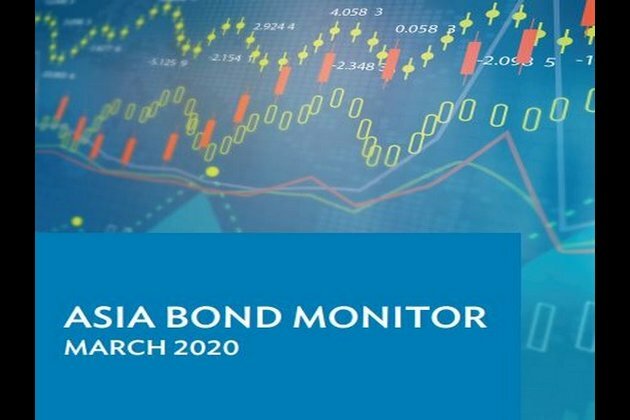East Asian economies adversely affected due to COVID-19
ANI
25 Mar 2020, 17:25 GMT+10

Manila [The Philippines], Mar 25 (ANI): The novel coronavirus (COVID-19) pandemic and deepening global economic uncertainty are weighing heavily on local currency bond markets of emerging East Asian economies, according to the latest issue of the Asian Development Bank's (ADB) Asia Bond Monitor releasedon Wednesday.
"Financial markets in the region are already feeling the brunt of the effects of the COVID-19 pandemic, with foreign investment and sector activities on the downside, coupled with ongoing trade issues," said ADB Chief Economist Yasuyuki Sawada.
"Efforts to cushion the negative impacts of the pandemic through stimulus packages and monetary measures to support affected households, businesses, and financial markets should continue."Emerging East Asia comprises China, Hong Kong, Indonesia, South Korea, Malaysia, the Philippines, Singapore, Thailand and Vietnam.
Apart from emerging East Asia, government bond yields also declined in major advanced economies and select European markets between December 31, 2019 and February 29, 2020 as investors took a risk-averse approach and local industries lessened activities due to the global health situation.
This resulted in equity market losses in the region, weakened currencies against the US dollar and widening credit default swap spreads. Market selloffs, which were observed in some regional bond markets in January and February, will likely continue.
Several central banks in emerging east Asia have cut their policy rates to mitigate the economic impact of COVID-19 pandemic. In March, the US Federal Reserve cut rates twice, leaving its interest rates near zero, along with other measures to support financial markets.
Local currency bonds outstanding in emerging East Asia totalled 16 trillion dollars at the end of December 2019, up 2.4 per cent from September 2019 and 12.5 per cent higher than December 2018.
Bond issuance in the region, meanwhile, totalled 1.44 trillion dollars in the fourth quarter of 2019, a 9.5 per cent decline from September last year. The local currency bond markets of South Korea and Malaysia had the highest bonds outstanding-to-gross domestic product ratios in the region at 130.5 per cent and 104.6 per cent respectively.
At the end of December 2019, government bonds totalled 9.8 trillion dollars, 1.7 per cent higher than September 2019. Corporate bonds, meanwhile, reached 6.2 trillion dollars on the back of 3.5 per cent growth from September last year.
China's local currency bond market remained the largest in emerging East Asia, accounting for 75.4 per cent of the region's total. (ANI) Share
Share
 Tweet
Tweet
 Share
Share
 Flip
Flip
 Email
Email
Watch latest videos
Subscribe and Follow
Get a daily dose of London Mercury news through our daily email, its complimentary and keeps you fully up to date with world and business news as well.
News RELEASES
Publish news of your business, community or sports group, personnel appointments, major event and more by submitting a news release to London Mercury.
More InformationUK Editorials
SectionTest torment over for Wales with Brave Blossoms win
Test torment over for Wales with Brave Blossoms win
AT&T contributes $200,000 to support communities affected by Texas floods
AT&T contributes $200,000 to support communities affected by Texas floods
TRULEO releases AI-powered witness capability for law enforcement
TRULEO releases AI-powered witness capability for law enforcement
Streamlight introduces Protac HP-X USB and Prrotac HP-X
Streamlight introduces Protac HP-X USB and Prrotac HP-X
FBI awards $10M contract to Galvion for new ballistic helmets
FBI awards $10M contract to Galvion for new ballistic helmets
Business
SectionAI saves $500 million for Microsoft as layoffs reshape strategy
REDMOND, Washington: Artificial intelligence is transforming Microsoft's bottom line. The company saved over US$500 million last year...
FTC’s rule to ease subscription cancellations struck down by court
WASHINGTON, D.C.: A federal rule designed to make it easier for Americans to cancel subscriptions has been blocked by a U.S. appeals...
Musk’s X loses CEO Linda Yaccarino amid AI backlash, ad woes
BASTROP, Texas: In a surprising turn at Elon Musk's X platform, CEO Linda Yaccarino announced she is stepping down, just months after...
Ex-UK PM Sunak takes advisory role at Goldman Sachs
NEW YORK CITY, New York: Former British prime minister Rishi Sunak will return to Goldman Sachs in an advisory role, the Wall Street...
Gold ETF inflows hit 5-year high as tariffs drive safe-haven bets
LONDON, U.K.: Physically backed gold exchange-traded funds recorded their most significant semi-annual inflow since the first half...
PwC: Copper shortages may disrupt 32 percent of chip output by 2035
AMSTERDAM, Netherlands: Some 32 percent of global semiconductor production could face climate change-related copper supply disruptions...













